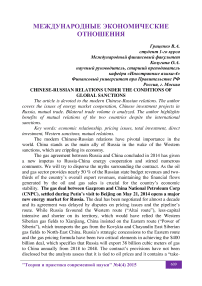Chinese-Russian relations under the conditions of global sanctions
Автор: Гриценко В.А.
Журнал: Теория и практика современной науки @modern-j
Рубрика: Международные экономические отношения
Статья в выпуске: 5 (5), 2015 года.
Бесплатный доступ
The article is devoted to the modern Chinese-Russian relations. The author covers the issues of energy market cooperation, Chinese investment projects in Russia, mutual trade. Bilateral trade volume is analyzed. The author highlights benefits of mutual relations of the two countries despite the international sanctions.
Economic relationship, pricing issues, total investment, direct investment, western sanctions, mutual relations
Короткий адрес: https://sciup.org/140266720
IDR: 140266720
Текст научной статьи Chinese-Russian relations under the conditions of global sanctions
The modern Chinese-Russian relations have pivotal importance in the world. China stands as the main ally of Russia in the wake of the Western sanctions, which are crippling its economy.
The gas agreement between Russia and China concluded in 2014 has given a new impetus to Russia-China energy cooperation and stirred numerous comments. We will try to disperse the myths surrounding the contract. As the oil and gas sector provides nearly 50 % of the Russian state budget revenues and two-thirds of the country’s overall export revenues, maintaining the financial flows generated by the oil and gas sales is crucial for the country’s economic stability. The gas deal between Gazprom and China National Petroleum Corp (CNPC), settled during Putin’s visit to Beijing on May 21, 2014 opens a major new energy market for Russia. The deal has been negotiated for almost a decade and its agreement was delayed by disputes on pricing issues and the pipeline’s route. While Russia favoured the Western route (“Altai route”), less-capital intensive and shorter on its territory, which would have relied the Western Siberian gas fields to Xianjiang, China insisted on the Eastern route (“Power of Siberia”), which transports the gas from the Kovykta and Chayandin East Siberian gas fields to North-East China. Russia’s strategic concessions to the Eastern route and the gas pricing formula have been two critical elements in achieving the $400 billion deal, which specifies that Russia will export 38 billion cubic meters of gas to China annually from 2018 to 2048. The contract’s provisions have not been disclosed but the analysts assess that it is tied to oil prices and it contains a “take- or-pay” clause. Regarding the average price paid by China, the estimations differ from $350 per thousand cubic meters (m/cbm) to 370-$380 m/cbm. The construction of the $55 billion “Power of Siberia” pipeline was launched in September 2014 by Russia and in June 2015 by China. A second gas deal, on the “Altai route”, negotiated by Vladimir Putin and Xi Jinping in November 2014, envisages the supply of 30 billion cubic meters of Russian gas a year for a period of 30 years, with further increase to 100 billion cubic meters. Nevertheless, this agreement’s implementation is loomed by some uncertainties, as the unspecified starting date or China’s further intention to re-negotiate on pricing formula.
China and Russia are mulling 32 projects with total investment of up to $75 billion, Kirill Dmitriev, CEO of Russian Direct Investment Fund (RDIF), the country's sovereign wealth fund. The projects concern a plethora of areas such as metal, oil, gas, agriculture and infrastructure.
Although China’s direct investment share has shrunk 25% in 2015 trade between Russia and China has grown rapidly as the leaders of both countries have committed to advancing bilateral economic cooperation. The two countries are reducing the use of US dollar in bilateral trade in favor of their own currencies, calling attention to the importance of their economic relationship.
Bilateral trade volume between the two countries, which amounted to $15.8 billion in 2003, has increased more than 6 times over the last 10 years, reaching $95.3 billion in 2014.
However, the trade volume between China and Russia slumped by 30.7 percent year-on-year in the first two months of 2015, and China's foreign direct investment in Russia also dropped by 8.2 percent year-on-year during the same period, data from China's Ministry of Commerce showed.
To conclude I would like to point out that the current cooperation between Russia and China has so far been a fruitful one in spite of all the difficulties and obstacles hindering the mutual relations of the two countries.
Список литературы Chinese-Russian relations under the conditions of global sanctions
- China and Russia: the world's new superpower axis? - 2015. Available on: http://www.theguardian.com/world/2015/jul/07/china-russia-superpower-axis
- Russia-China relations at «historic peak» despite «illegitimate Western restrictions» -Putin. - 2015. Available on: https://www.rt.com/news/313998-putin-china-visit-xinhua


